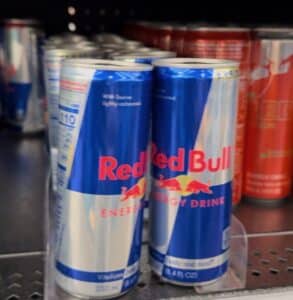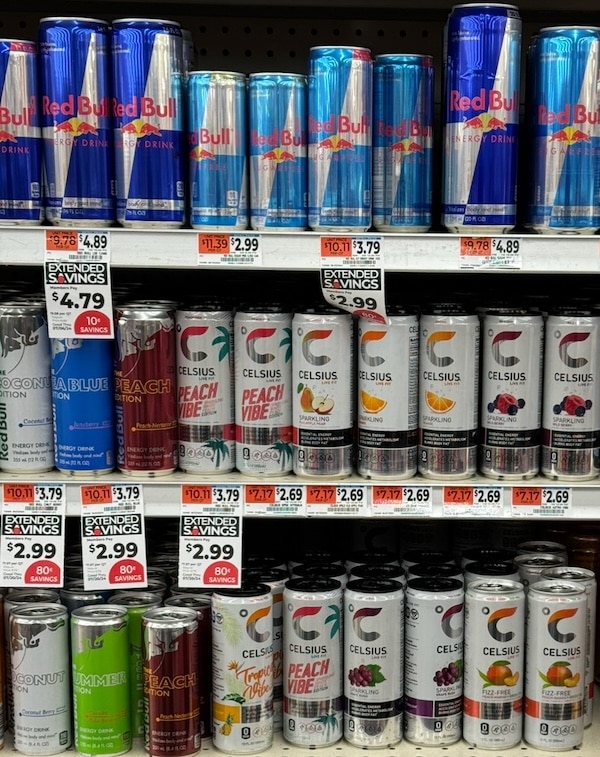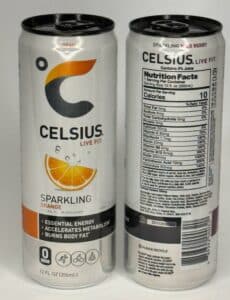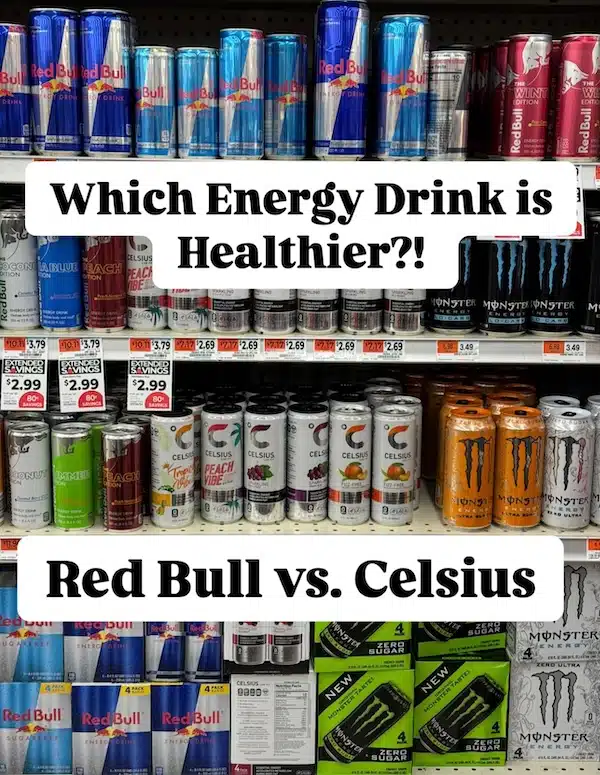Celsius vs Red Bull: Is Celsius Healthier than Red Bull?
Comparing Celsius vs Red Bull is important because, according to a 2024 Statista survey, 32% of Americans aged 18 to 29 consume energy drinks regularly, underscoring their growing role in modern lifestyles.
Whether it’s for enhancing athletic performance or fighting off fatigue during long workdays, energy drinks like Red Bull and Celsius have become a staple for millions, particularly among younger generations seeking a quick energy boost.
However, with this surge in consumption comes the need for a closer examination of their health impacts, and it is more important than ever to choose the healthiest energy drinks– especially since there are many quality options available!
Energy drinks—especially those high in caffeine and sugar—can pose significant health risks, raising questions about which options are truly better for you.
The same Statista survey shows that 35% of people aged 30 to 49 also reach for energy drinks regularly, proving that it’s not just a young adult trend.
As their popularity rises, it’s essential to explore healthier alternatives.
While water and natural hydration solutions remain the gold standard for health, energy drinks like Celsius or Red Bull fill a specific need for those looking for an extra energy boost.
Personally, I’ve switched to CELSIUS Energy Drinks, preferring their more natural ingredients, such as green tea extract and guarana, which also offer added fat-burning benefits.
In this article, I’ll break down the ingredients and effects of Celsius vs Red Bull to help you make an informed choice. I’ll also compare these two popular drinks in terms of caffeine content, ingredients, taste, and their overall health implications!
Celsius vs Red Bull: Ingredients Comparison

Celsius Ingredients: Natural and Clean
Celsius is known for its commitment to natural ingredients.
Key ingredients include:
- Green Tea Extract: Rich in antioxidants, supports metabolism, and fat burning.
- Guarana Extract: A natural source of caffeine that enhances focus and energy.
- Ginger Root Extract: Helps with digestion and has anti-inflammatory properties.
- B Vitamins: Essential for energy production and brain function.
Celsius does not contain artificial flavors, colors, or preservatives, which further enhances its appeal as a healthier option.
In fact, Celsius drinks can help burn fat and optimize your body composition!
Additionally, Celsius is designed to be a low-calorie, sugar-free option that still provides essential nutrients:
- Calories: 10 per serving
- Caffeine: 200 mg
- Vitamins: High in B vitamins, vitamin C, and biotin
- Minerals: Includes calcium and chromium, both important for metabolic health
The absence of sugars and the inclusion of vitamins and minerals make Celsius a healthier choice for those watching their calorie and sugar intake.
Celsius’s natural ingredients and weight management complex content offer numerous potential health benefits, such as improved metabolism, increased focus, and better workout performance.
However, the high caffeine level could be a risk for those sensitive to stimulants, potentially leading to issues like jitteriness, increased heart rate, or insomnia.
Red Bull Ingredients: Sugar and Synthetics

Red Bull, on the other hand, includes both natural and artificial ingredients:
- Taurine: An amino acid that supports cardiovascular health and energy levels.
- Artificial Sweeteners: Such as aspartame and acesulfame K in sugar-free versions, which have been linked to potential health risks.
- Sugars: The regular version of Red Bull contains significant sugar content, which can lead to weight gain and increased blood glucose levels.
Red Bull’s nutritional profile is centered around quick energy from sugar and caffeine:
- Calories: 110 per serving
- Caffeine: 80 mg
- Sugars: 26 grams per serving
- Vitamins: B vitamins for energy metabolism
- Minerals: Includes magnesium carbonate, which can support muscle and nerve function
Red Bull’s formula provides a quick energy boost, thanks to its combination of caffeine and sugar.
However, the high sugar content and artificial ingredients present potential health risks, including weight gain, metabolic disruption, and increased cardiovascular strain.
Winner – Celsius
When comparing the ingredients side by side, Celsius stands out for its natural and health-promoting ingredients, while Red Bull’s formula relies more on sugars and artificial additives.
For those prioritizing clean, natural ingredients, Celsius is the clear winner, even though many people still wonder, “Is Celsius bad for you?”
Celsius offers a low-calorie, sugar-free option that supports energy without adding unnecessary calories, making it better suited for those managing weight or blood sugar levels.
For those looking to support long-term health and energy without the drawbacks of high sugar intake, Celsius is the preferable option.
Red Bull may still have its place for quick energy needs, but it’s important to be mindful of the sugar and calorie content.
Regular consumption of Celsius, with its natural and low-calorie formula, is likely to have fewer negative long-term health effects compared to Red Bull, which could contribute to health issues if consumed excessively over time.
One key note is that Red Bull is NSF Certified, which means that, technically, they are safer for athletes who are regularly drug tested. However, I do not believe Celsius drinks can make you fail a drug test, and they are even endorsed by Olympic Sprinter Noah Lyles.
Red Bull vs Celsius: Caffeine Content Comparison

Caffeine is the cornerstone of any energy drink, providing the primary boost in alertness and focus.
For most people, moderate caffeine consumption can enhance mental and physical performance, but the amount and source of caffeine vary between different drinks.
Celsius Caffeine Content

A 12 fl oz can of Celsius contains 200 mg of caffeine, sourced from natural ingredients like guarana seed extract and green tea extract.
For a stronger kick, Celsius Essentials contain 270mg of caffeine per can.
This high caffeine content makes Celsius a potent choice for those who need a substantial energy boost.
Red Bull Caffeine Content
In comparison, an 8.4 fl oz can of Red Bull contains 80 mg of caffeine.
Red Bull uses synthetic caffeine, which, while effective, may not offer the same gradual release as natural sources.
Winner – It Depends on What You Want
When breaking down the caffeine content per ounce, Celsius provides 16.67 mg of caffeine per ounce, while Red Bull offers 9.52 mg per ounce. This makes Celsius nearly 1.75 times stronger in caffeine concentration, leading to a more intense energy boost.
However, if you’re sensitive to caffeine, Red Bull’s lower caffeine content might be more suitable.
For those who can handle higher levels of caffeine, drinking Celsius before workouts or during long workdays can be particularly beneficial.
Taste and Flavor Review: Which is More Enjoyable to Drink?
Celsius Taste Review
Celsius offers a wide range of flavors, both carbonated and non-carbonated, such as Sparkling Orange, Green Tea Peach Mango, and Sparkling Fuji Apple Pear.
Many users describe Celsius as tasting similar to diet soda, with a lighter and more natural flavor profile compared to other energy drinks. The fruity flavors are easy to enjoy, making it a drink that many people quickly get accustomed to.
Red Bull Taste Review
Red Bull is known for its distinct, sweet, candy-like flavor. The original Red Bull taste remains one of the most recognizable in the industry.
While it has variations like Peach, Watermelon, and Tropical Fruit, the classic flavor is specific and unique—something that people either love or dislike.
Winner – A Tie!
This is truly a matter of preference.
If you prefer a lighter, fruitier energy drink, Celsius will likely be your go-to. But for those who enjoy the iconic taste of Red Bull, nothing quite matches it. Personally, I find both enjoyable for different reasons, making this category a tie.
Final Thoughts: Is Celsius or Red Bull Healthier?
Winner – Celsius!
While I can’t say the same for Red Bull, Celsius Drinks are not bad for you and can even help with improving your health.
Celsius is ideal for individuals who are health-conscious, seeking natural ingredients, and can handle a higher caffeine content.
It’s particularly suitable for pre-workout energy, long workdays, or those on a calorie-restricted diet.
Red Bull is best for those needing a quick, familiar energy boost with a moderate caffeine content. It’s a convenient choice for mid-day slumps or short-term energy needs, especially for those who prefer a sweeter taste.
When choosing between Celsius and Red Bull, consider your personal health goals, caffeine tolerance, and taste preferences.
If you prioritize natural ingredients and low sugar, Celsius is the way to go. If you need quick energy with a familiar taste, Red Bull might be more your style.
You can buy Celsius drinks at nearly every local convenience or grocery store in the United States, or you can order On-the-Go Celsius Packets for added convenience during your days.
Last update on 2025-04-16 / This article includes affiliate links/Images via Amazon Product Advertising API. I may earn commissions on purchases made through these links.
FAQs: Common Questions Answered
- Does Celsius or Red Bull Have More Caffeine? Celsius has more caffeine per serving compared to Red Bull, offering 200 mg versus Red Bull’s 80 mg.
- Is Celsius Healthier Than Red Bull? Generally, yes. Celsius uses natural ingredients and contains no sugar, making it a healthier option for most people.
- What Are the Side Effects of Drinking Celsius or Red Bull? Potential side effects include jitteriness, increased heart rate, and insomnia from caffeine. Red Bull’s high sugar content can also contribute to weight gain and metabolic issues.
- Can I Drink Celsius or Red Bull Every Day? Moderation is key. Daily consumption of either should be considered carefully, particularly for those sensitive to caffeine or watching their sugar intake.
- Is Red Bull or Celsius a Better Pre-Workout? I suggest that you choose Celsius as a pre-workout due to its higher caffeine content and natural ingredients, which provide a clean energy boost.
Read Next: Celsius vs Monster: Which Energy Drink is Healthier?




